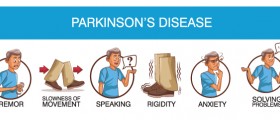
Introduction To Parkinson's
Parkinson's disease is a progressive neurological disorder that in developed stages leads to tremor (shaking) and problems with coordination, speech and walking. The condition generally affects movement. Parkinson's disease develops gradually and in the initial stage there is a fine and barely noticeable tremor in just one hand. Unfortunately, Parkinson's disease is incurable. However, there are many drugs that can treat symptoms and control them to certain extent.
What Are Causes of Parkinson's Disease?
There are many causes of Parkinson's disease. In majority of people suffering from Parkinson's disease the condition is classified as idiopathic, meaning that the underlying cause cannot be identified.
Acetylcholine and dopamine are brain neurotransmitters. Acetylcholine is in charge of muscle contraction while dopamine acts as antagonist and reduces muscle contraction. In many patients there is a lack of dopamine. Scientists believe that damage to dopamine producing-cells in the brain is responsible for Parkinson's disease. But studies have only shown that the activity of such cells decreases and that their number does not change. Another theory is that the condition develops as a consequence of improper functioning or synthesis of enzymes that regulate dopamine production or lack of substances necessary for dopamine production. Anything that interferes with dopamine synthesis is a potential cause of Parkinson's disease.
Parkinson's Disease and Toxins
A variety of toxins can cause symptoms that resemble Parkinson's disease. They include herbicide, pesticide, fungicide, certain solvents such as toluene or N-hexane, carbon monoxide, mercury, copper and cyanide.
Parkinson's Disease and Genetics
People with specific genetic mutations (PARK1, PARK2, PARK3, PARK5, PARK6, PARK7, PARK8 and PARK 12) are more susceptible to Parkinson's disease comparing to people without these genetic mutations. This does not mean that a person will develop the disorder but it simply increases the chance for Parkinson's disease.
Head Trauma
People who have had a head trauma and injury are at higher risk of developing Parkinson's disease in the future. The risk increases even more if the injury has been severe and caused damage to specific parts of the brain.
Iatrogenic Parkinson's Disease
In this case symptoms and signs of Parkinson's disease develop due to the intake of certain medications. The most common drugs able to produce symptoms and signs that resemble those of Parkinson's disease include certain drugs used to treat schizophrenia and psychosis. They induce typical symptoms by reducing the amount of dopamine and subsequently affecting its functions. Trimetazidine is a medication used in patients suffering from angina pectoris. The drug may cause Parkinsonism but, fortunately, the problem is reversible.















-When-You-Have-Parkinson's-Disease_f_280x120.jpg)

Your thoughts on this
Loading...